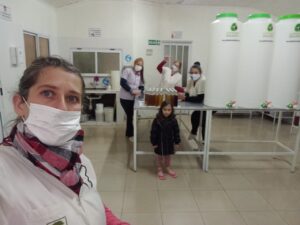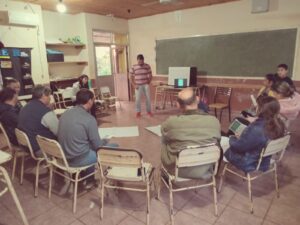Annual report – Security & Prevention
Forests suffer constant pressures, such as those exerted by agricultural expansion, climate change, urban development, invasion of non-native species and excessive resource extraction.
CRUCE CABALLERO, SAN PEDRO DEPARTMENT, MISIONES
Sustainably managed forests and jungles, from an environmental perspective, have proven to increase forest mass and recover degraded and deforested areas as well as capture more carbon in the long term; and from a social perspective, they generate better living conditions and development for the communities that manage them.
OBJECTIVES OF THE SECURITY AREA
In relation to the above mentioned, Nideport developed a specific area with the objective to provide security explicitly focused on the integral conservation of soil, flora and fauna, as well as considering the conditions, and especially, the welfare of the native settlements’ populations.
To this end, it is essential to establish relations and interact with related institutions, especially those with police powers, in order to control and prevent poaching by hunters, fishermen and loggers.
When intervening, priority is given to respecting and caring for the environment, using mechanisms related to carefulness and consideration that are not usually taken into account in common security practices.
The actions of poachers and fishermen have severe consequences on the native fauna of the area, affecting the populations of species already seriously affected by the loss of their habitat. Therefore, action will be taken, regardless of the intentionality or ulterior objective of its executors, for violating the conservation principles of the project. Similar action will be taken against illegal loggers.
In summary, this form of action responds to support the actions of all the competent institutions in the fight against poaching and trafficking of illegal goods, explicitly prioritizing environmental care.
ONGOING AND COMPLETED PROJECTS
The precise location, and therefore its subsequent construction, of the future “Binational Detachment” adjacent to the Pepirí Guazú River on the border with Brazil is underway, as well as the decentralization of the said detachment of three surveillance posts on the border in question, and the projection of a coastal road in line with the course of the said river, this sector being considered as the most compromising in terms of security.
In addition, and along with the tasks in process, we are planning the construction of a main entrance post with a barrier and personnel, called prevention guard, located in the sector where the sawmill used to operate. This entrance will act as the main access where all the entrances and exits will be recorded.
In addition, dissuasive signs will continue to be placed in different parts of the property, with the distinction that those placed on the border with Brazil will be bilingual (Spanish and Portuguese).
The selection and incorporation of personnel with the appropriate profile will also play a decisive role, since they will be thoroughly interviewed and instructed in relation to the security objectives at the site.
As regards logistics, it is planned, in the intermediate term, to have three vehicles, two of them with four-wheel drive, and all the basic and essential elements to carry out the task of prevention and action against offenders, as well as everything related to prevention and action against forest fires, with the construction of artificial reservoirs and the acquisition, in the long term, of an adapted helicopter.
At this stage, the National Gendarmerie is making arrangements for the availability of its regional helicopter to fly over the entire area of the property, which will help determine its condition in detail.
We are also in the process of collaborating with and advising other areas of the company in terms of communication and technical content (such as Marketing, Forest Management, Community, UAV and Infrastructure, among others).
We are also working on the operational articulation of the personnel trained in the company with the preventive forces (such as the National Gendarmerie, Misiones Police and Provincial Park Rangers).
The baseline information project is considered to have been completed and the respective report is being finalized.
The program of interviews with the institutions included in the planning has been fully completed, allowing an excellent relationship and therefore an effective interaction.
This interaction allows for joint work with the provincial park rangers, the Misiones Police (Environmental Defense Division) and the National Gendarmerie, which, based on the results obtained, is considered strategic and effective, allowing for gradual protection within the preset forecasts.
COMPLIANCE AND SELF-ASSESSMENT OF PERFORMANCE
It is estimated that 40% of what was planned has been accomplished within the established guidelines.
The performance of the team in charge of the area is outstanding. Satisfactory field work has been carried out. It has consisted of a thorough examination of evidence generated by frequent offenders, the exploration of critical sectors, the detection and dismantling of hunting camps, and arrests in flagrante delicto in combination with the respective forces.
This work has facilitated the development of a large part of this percentage, overcoming obstacles such as difficulties travelling due to the poor road conditions, exposure to vermin and the potential aggression of poachers.
It should be noted that during this stage, given the lack of permanent surveillance personnel, the placement of dissuasive signs in previously studied sectors was decisive, which conditioned the actions of hunters and illegal loggers.
In addition, non-conventional security is considered, given that this is a jungle terrain where the criminal aspect is limited to poachers and illegal loggers. These non-traditional criminal behaviors have contributed to the incorporation of new knowledge and experiences.
Finally, the aforementioned incorporation has satisfactorily enriched our capabilities, allowing for professional growth that leads to the fulfillment of the established requirements, thus strengthening our knowledge for future challenges.

















